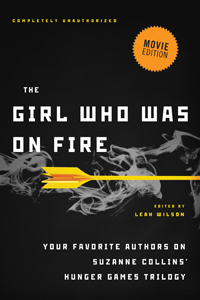Last May, the publicity team at BenBella Books offered me a copy of a collection of critical essays about Suzanne Collins’ The Hunger Games series, The Girl Who Was on Fire. In celebration of The Hunger Games movie, BenBella Books has released an updated, movie tie-in edition of the book with three new essays and, if you buy the ebook edition, bonus movie content a week after the film is released. According to a press release they sent out with the book,
On March 23, 2012, the film The Hunger Games, starring Jennifer Lawrence, hits theaters—and one week later, Smart Pop will provide e-book buyers with those YA authors’ thoughts about the film.
“With our book, we envisioned e-book buyers being able to read the book while waiting for the movie, then pick up their e-reader of choice after they see the film and find fresh content there waiting for them—all as part of a single book package, and a single purchase,” said Smart Pop editor-in-chief Leah Wilson.
There is also an option to buy a “Booster Pack” ebook, which includes the three new essays and the movie content a week later. I was a big fan of the original collection, so when BenBella Books offered to send me a copy of the updated, movie tie-in addition to check out the new essays, I was really excited.
After reading the new edition and revisiting some of my favorite essays from the original, I’m happy to say that the three new essays are a great addition to the book and I think help round-out the discussion in some interesting ways.
In “Hunger Game Theory,” author Diana Peterfreund goes through the basics of game theory and how it can be used to better understand the logic that goes on inside the Hunger Games and between the Tributes and the Gamemakers. It’s a really interesting (and useful) way of thinking about how the games work (and how they can be broken).
My favorite of the three new essays was probably “Did the Third Book Suck?” by Brent Hartinger. Hartinger presents two arguments, one about why Mockingjay was a letdown and one suggesting that it was actually a “bold, risky work on a classic theme,” and what an individuals feeling about the book might say about them. I’m still on the fence about Mockingjay, and I thought Hartinger hit on the things that make the book so different from the first two really well.
The final new essay — “Gale: Knight, Cowboy, Badass’ — by Jackson Pearce is about everyone’s favorite brooding hunter, Gale. Pearce writes about why Katniss could never have ended up with Gale, and how his role as the archetypal knight/cowboy helps the book reach it’s final conclusion. Again, it’s a nice addition to the book, which originally didn’t have many pieces that addressed Gale (other than in the context of the Katniss/Peeta/Gale triangle).
Even though I’ve read the three extra essays, I bought the movie tie-in edition booster back for my Nook so I can check out the new essays after the movie comes out. The boyfriend and I have plans for a date night to see the movie this weekend, and I know I’ll be scouring the internet for reviews and critiques (like this excellent piece from Linda Holmes at NPR Monkey See) until the essays come out. If you’re a fan of The Hunger Games and light literary criticism, I think The Girl Who Was on Fire is a read you should absolutely pick up.
P.S. I don’t feel like I got to talk much about the Indie Lit Awards generally this week — too many reviews to post! — so I’m planning to do a bit of a recap of all the titles and some general thoughts on the short list this year on Sunday/ Stay tuned!
Re-Review: ‘The Girl Who Was on Fire’ edited by Leah Wilson is a post from: Sophisticated Dorkiness, © 2010.
